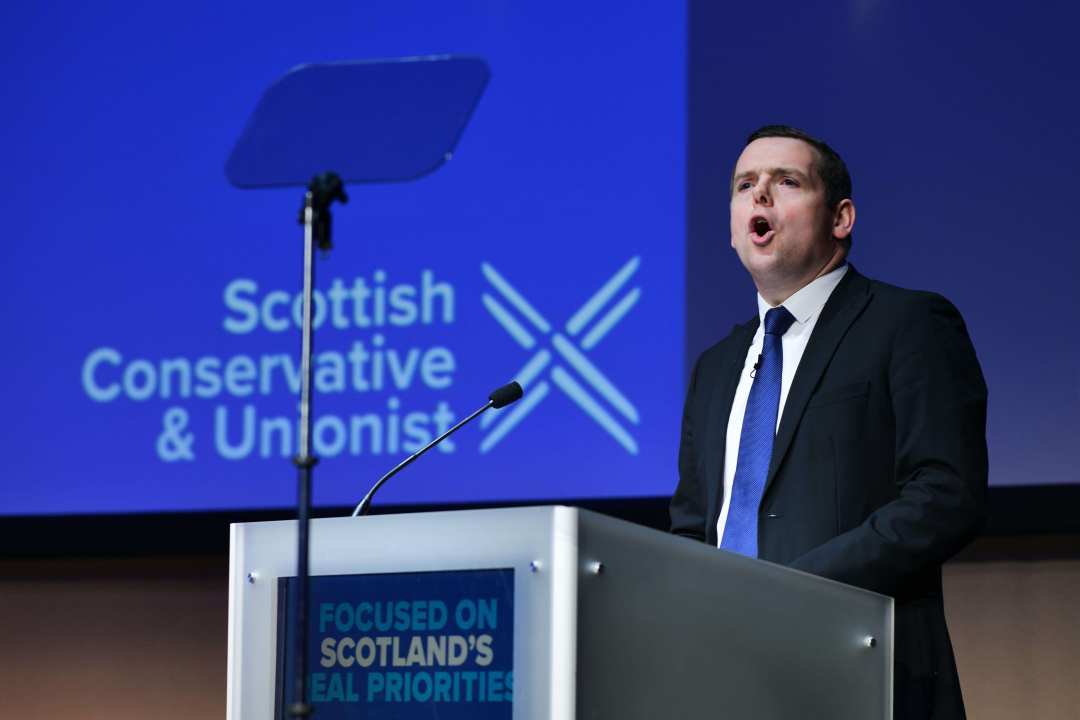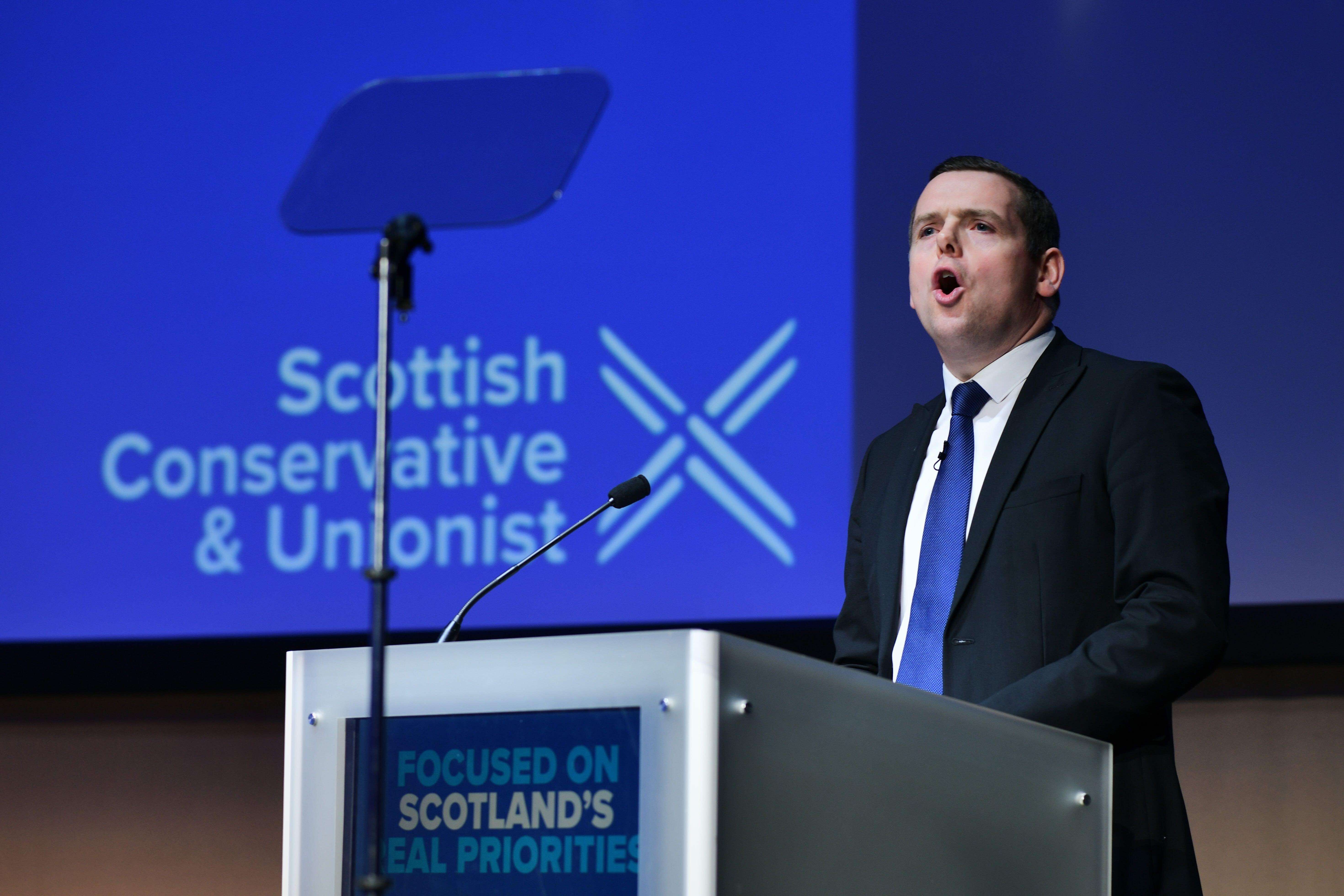The Scottish National party’s implosion brings good news for the Scottish Conservatives. At the Tories’ party conference in Glasgow, delegates had a spring in their step about their party’s rising chances. Poll results show that the Unionist parties are seeing their support gradually increase, while the SNP’s grip on power looks to be weakening, Meanwhile, support for the Greens, though not especially high to begin with, has halved.
Scottish Tory leader Douglas Ross was joined in Glasgow at the weekend by an all-star cast from Westminster, including Prime Minister Rishi Sunak, secretary of state for Scotland Alister Jack and levelling up secretary Michael Gove. But while it is clear the party has a vision, its presentation was diluted somewhat by an overwhelming focus on SNP failures.
While it is clear the party has a vision, its presentation was diluted somewhat by an overwhelming focus on SNP failures
The Scottish Conservatives are the only political party in Scottish politics that is focused on the ‘real priorities’, said chairman Craig Hoy, citing the SNP’s culture of ‘secrets and lies’, its ‘addiction to division’ and Nicola Sturgeon’s penchant for ‘all talk, no delivery’. Michael Gove spent time criticising the appointment of a minister for independence and how the Scottish National party has ‘overreached’. In Douglas Ross’s speech on Friday, the first day of the conference, ‘the SNP’ was mentioned 45 times and the Scottish Tory leader didn’t even start to discuss the Scottish Conservatives’ vision until almost 15 minutes of his talk had elapsed.
While Ross has since protested that he wasn’t simply going to ‘ignore the internal strife’ occurring within his rival party, there is a concern that Westminster’s blocking of a second independence referendum has blown his party’s own raison d’etre out of the water. If the threat of Indyref 2 has dissipated, another danger has emerged: voters have less reason to support a Unionist party if the separatist counterpart has no feasible way of splitting up the Union. The main problem facing the SNP poses, ironically, a rather large issue for the Scottish Conservatives.
This hasn’t escaped the attention of some Tory politicians. At the weekend conference, Gove talked about his suspicion that the SNP will now ‘rebrand themselves as Scotland’s party fighting for more resources at Westminster, and fighting to ensure that they deliver domestically, in tune with Scottish values more broadly’.
‘This creates a challenge for us,’ Gove continued, ‘but also an opportunity. The opportunity is to say, well, at Westminster, the people who are actually delivering most for Scotland are the Conservative government and Scottish Conservative MPs.’
Will this fly with Scottish voters? Many of those who are not pro-independence are still pro-devolution – and so David Frost’s Daily Telegraph column caused significant unrest after the Tory peer called for the reversal of Scottish devolution. Sunak didn’t go as far as Frost, but ruffled feathers during the conference by calling Scotland a ‘devolved assembly’. The PM said:
‘All this talk of needing any more powers is clearly not right. The SNP and the Scottish government don’t even use all the powers they already have. We should stop talking about any more.’
Gove pushed back a little harder when asked whether he agreed with Frost’s sentiments, saying: ‘No, I disagree. He’s wrong about that.’
A different version of devolution was put forward by the Conservatives at the weekend, the focus shifting from Holyrood to a more local level. ‘We can devolve powers to local communities,’ Sunak said, ‘Those local communities are really keen to engage with the UK government. They know what the priorities of their local areas are more so than Nicola Sturgeon and the SNP do. We don’t have to just hand everything over to the Scottish government and I think that’s real devolution.’
Rural communities received a significant amount of airtime at the conference – perhaps unsurprisingly, given Scottish Tory leader Ross is the MSP for the Highlands and Islands. The Conservatives are pitching themselves as the only party supportive of Scotland’s North Sea oil and gas industry, ‘because we know we need to increase our energy security, not increase our reliance on Vladimir Putin’.
The Prime Minister made his first visit to Scotland in January this year to award freeport status to Inverness and the River Forth, meaning these areas are able to offer tax incentives and lower tariffs to help stimulate economic growth. ‘Most crucially,’ Sunak said at the conference, ‘[these freeports will] create jobs for our young people in the industries of the future.’ The Tories appear to be pitching themselves as the party of the workers, and industry, in Scotland.
The Scottish Conservatives appear to be taking the concerns of the Scottish fishing industry seriously too, criticising the proposed Highly Protected Marine Areas (HPMAs) for coastal areas around Scotland and forcing a vote in Scottish parliament this Wednesday in a bid to reverse the planned fishing bans. HPMAs have been opposed by a number of island councils, including Argyll and Bute, the Western Isles, Orkney and Shetland.
But the party isn’t alone in raising issues with the proposed fishing ban. Discussion about HPMAs may feel oddly familiar because Kate Forbes pledged, during her SNP leadership campaign, that if elected she would row back on HPMA proposals. This morning, Forbes spoke out again:
‘The critical issues facing these communities is depopulation. Fishing supports so many livelihoods in these communities. My concern, and the concern of these communities, is that if we cut off that lifeline to the sea then it could jeopardise that population recovery.’
Forbes has also said in the past that she would have considered devolving marine powers to local authorities – similar again to the Conservatives’ own vision for ‘real devolution’ in Scotland.
It’s true that there was a feeling of widespread relief at the conference that Forbes had not been elected as SNP leader. Her political views, in combination with the diminished chances of another independence referendum in the near future, would have made it all the more difficult for the Scottish Conservatives to pull in new voters and one-up the SNP. Indeed, with rumours of Forbes plotting a coup – which the politician herself has strenuously denied on social media – the brief warning issued in Hoy’s opening speech is all the more pertinent.
‘Remember this,’ he said, ‘the SNP may be down, but they are not out. And if continuity won’t cut it for the SNP then complacency won’t cut it for us either.’
Words to be heeded by the party’s own politicians, some would remark, as SNP-bashing will only get them so far. As 2024’s general election gets ever closer, it is felt that the Scottish Conservatives will have to better distil their messaging if they want to emerge as a credible new choice for disillusioned Scottish voters.








Comments